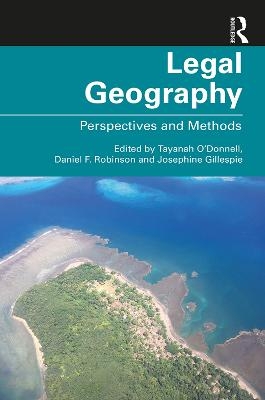
Legal Geography
Routledge (Verlag)
978-1-138-38738-6 (ISBN)
This book is the first legal geography book to explicitly engage in method. It complements this by also bringing together different perspectives on the emerging school of legal geography. It explores human–environment interactions and showcases distinct environmental legal geography scholarship.
Legal Geography: Perspectives and Methods is an innovative book concerned with a new relational and material way of examining our legal-spatial world. With chapters examining natural resource management, Indigenous knowledge and political ecology scholarship, the text introduces legal geography’s modes of analysis and critique. The book explores topics such as Indigenous environmental rights, the impacts of extractive industries, mediation of climate change, food, animal and plant patents, fossil fuels, mining and coastal environments based on empirical, jurisdictional and methodological insights from Australia, New Zealand and the Asia-Pacific to demonstrate how space and place are invoked in legal processes and contestations, and the methods that may be employed to explore these processes and contestations.
This book examines the role of legal geographies in the 21st century beyond the simple “law in action”, and it will thus appeal to students of socio-legal studies, human geography, environmental studies, environmental policy, as well as politics and international relations.
Tayanah O’Donnell has over ten years’ experience focused on the law and the legal geographies of climate change adaptation. Her papers and research cover themes such as property rights, land use planning, climate law, coastal policy and management, and the legal, political and cultural impacts of climate change regulation. Daniel F. Robinson has more than 15 years’ experience focused on the regulation of nature and knowledge. His papers and books cover themes including “biopiracy”, access and benefit-sharing relating to biological resources, appropriation and regulation of Indigenous knowledge, Indigenous/customary laws and biocultural protocols, ethical biotrade, political ecology, environmental policy and management. Josephine Gillespie is an academic, and former lawyer, based at the University of Sydney, Australia. She is an environmental legal geographer interested in the complex intersection of geography and law. Her research investigates environmental protection and human–environment geographies throughout Australia and the Asia-Pacific.
Contributors. Acknowledgements. Part 1: Introduction 1. An Australasian and Asia-Pacific approach to legal geography. Part 2: Investigating the legal geographies of Indigenous peoples and local communities and their environments 2. Challenges in legal geography research methodologies in cross-cultural settings. 3. Asserting land rights through technology and democratic expression: the effect of the Indigenous Peoples Alliance of the Archipelago v Indonesia case. 4. Islam, legal geography and methodological challenges in Indonesia. 5. Patent landscaping for Vanuatu: specific legal geographic methods for Indigenous knowledge protection and promotion. 6. Consulting the consultators: a Kaupapa Māori-informed approach to uncovering Indigenous jurisdiction and shifting the research gaze. Part 3: Investigating the legal geographies of regulation
7. Inside-outside: an interrogation of coastal climate change adaptation through the gaze of ‘the lawyer’. 8. Legal geography – place, time, law and method: the spatial and the archival in “Connection to Country”. 9. Comparative legal geography: context and place in “legal transplants”. 10. The other is us: conservation, categories and the law. 11. Ask an “expert”: phenomenology and key informant interviews as a research method in legal geography. Part 4: Investigating the legal geographies of extractive industries 12. Sydney’s drinking water catchment: a legal geographical analysis of coal mining and water security. 13. Lawyers in legal geography: parliamentary submissions and coal seam gas in Australia. 14. Energising the law: greening of fossil fuels and the rise of gendered political subjects. 15. Exploring the production of climate change through the nomosphere of the fossil fuel regime. Part 5: In memoriam 16. Space, scale and jurisdiction in health service provision for drug users: the legal geography of a supervised injecting facility. Part 6: Conclusion 17. Conclusion: legal geography futures. Index.
| Erscheinungsdatum | 11.12.2019 |
|---|---|
| Zusatzinfo | 8 Tables, black and white; 6 Halftones, black and white; 11 Illustrations, black and white |
| Verlagsort | London |
| Sprache | englisch |
| Maße | 156 x 234 mm |
| Gewicht | 500 g |
| Themenwelt | Naturwissenschaften ► Geowissenschaften ► Geografie / Kartografie |
| Recht / Steuern ► Allgemeines / Lexika | |
| Recht / Steuern ► EU / Internationales Recht | |
| Sozialwissenschaften ► Soziologie ► Spezielle Soziologien | |
| Technik ► Umwelttechnik / Biotechnologie | |
| ISBN-10 | 1-138-38738-X / 113838738X |
| ISBN-13 | 978-1-138-38738-6 / 9781138387386 |
| Zustand | Neuware |
| Informationen gemäß Produktsicherheitsverordnung (GPSR) | |
| Haben Sie eine Frage zum Produkt? |
aus dem Bereich


